

Putting Open at the Heart of the Digital Age. Introduction I’m Rufus Pollock.
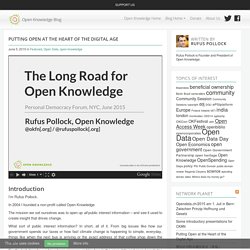
In 2004 I founded a non-profit called Open Knowledge The mission we set ourselves was to open up all public interest information – and see it used to create insight that drives change. Convergence towards the global middle: an emerging architecture for the international human rights movement. The international human rights movement is wrestling with a basic question: if all real change takes place at the local or national level—that is, human rights can only be realized by actual human beings living in specific contexts—what does it mean to be “international”?
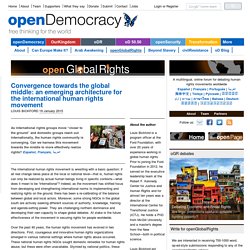
Indeed, as the movement has shifted focus from developing and strengthening international norms to implementing and realizing rights on the ground, there has been a re-calibrating of the balance between global and local actors. Moreover, some strong NGOs in the global south are actively seeking different sources of authority, knowledge, framing and agenda-setting power. They are challenging northern dominance and developing their own capacity to shape global debates. Berlin’s digital exiles: where tech activists go to escape the NSA. It’s the not knowing that’s the hardest thing, Laura Poitras tells me.

“Not knowing whether I’m in a private place or not.” Not knowing if someone’s watching or not. Though she’s under surveillance, she knows that. It makes working as a journalist “hard but not impossible”. It’s on a personal level that it’s harder to process. Poitras’s documentary about Edward Snowden, Citizenfour, has just been released in cinemas. Bad, not just for Snowden, I say? Protestforscher im Interview. 26.03.2014: »Kämpfe müssen vielfältig sein« Diplom-Soziologin Judith Vey ist Gastwissenschaftlerin am Institut für Protest- und Bewegungsforschung in Berlin.

The Global Resonance of the Real Democracy Movement. In a new paper, ROAR authors Leonidas Oikonomakis and Jerome Roos recount how the struggle for real democracy resonated with activists around the globe.
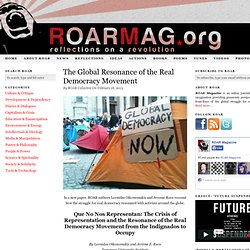
Que No Nos Representan: The Crisis of Representation and the Resonance of the Real Democracy Movement from the Indignados to Occupy By Leonidas Oikonomakis and Jérôme E. Roos European University Institute Paper to be presented at the conference on ‘Street Politics in the Age of Austerity: From the Indignados to Occupy’, University of Montreal, February 21-22, 2013. The Engagement Pyramid: Six Levels of Connecting People and Social Change. What does it mean to "engage people"?

Gideon Rosenblatt talks through six different levels of engagement people can have with your organization, in an article reprinted from Groundwire. Brazil explodes in a furious feast of democracy. Government U-turn on bus fares fails to stem wave of unrest as millions of Brazilians take to the streets in 100 cities in the biggest protests so far.
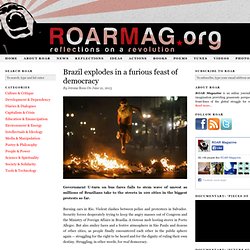
Burning cars in Rio. Violent clashes between police and protesters in Salvador. Security forces desperately trying to keep the angry masses out of Congress and the Ministry of Foreign Affairs in Brasília. The dangerous dreams of Slavoj Žižek. The new politics of the internet: Everything is connected. The new politics of the internet: Everything is connected. Opinion / Interview : Why the middle class is revolting. Saskia Sassen speaks with a formidable energy.
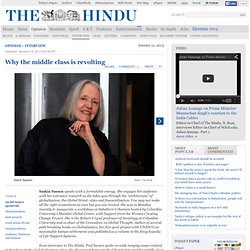
She engages her audience with her extensive research as she takes you through the “architecture” of globalization, the Global Street, cities and financialization. You may not make all the right connections at once but you are riveted. She was in Mumbai recently to inaugurate a workshop on Subaltern Urbanism hosted by Columbia University’s Mumbai Global Centre, with Support from the Women Creating Change Project.
She is the Robert S Lynd professor of Sociology at Columbia University and co chair of the Committee on Global Thought. Author of several path breaking books on Globalisation, her five-year project with UNESCO on sustainable human settlements was published as a volume in the Encyclopedia of Life Support Systems. The Dynamics of Protest Recruitment through an Online Network : Scientific Reports. The role that SNSs play in helping protests grow is uncontested by most media reports of recent events.
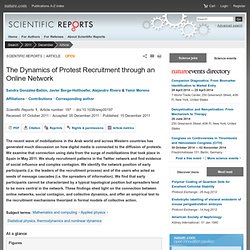
However, there is not much evidence of how exactly these online platforms can help disseminate calls for action and organize a collective movement. The Network Society After Web 2.0: What Students Can Learn From Occupy Wall Street. Web 2.0 is a common buzzword used to describe social media.
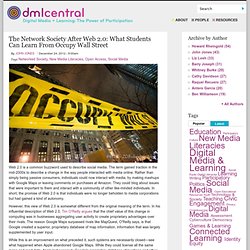
The term gained traction in the mid-2000s to describe a change in the way people interacted with media online. Rather than simply being passive consumers, individuals could now interact with media, by making mashups with Google Maps or leaving comments on purchases at Amazon. Syria's iPhone insurgency makes for smarter rebellion. News from the Aleppo frontline sounded good: Syrian rebels had expected the enclave under their control might be overrun by superior government forces, but instead they stopped the advance and knocked out several armored vehicles, leaving dead Syrian troops on the road. Skip to next paragraph Subscribe Today to the Monitor Click Here for your FREE 30 DAYS ofThe Christian Science MonitorWeekly Digital Edition But were those reports real? The answer came within an hour, a couple blocks from that fight in the embattled Salaheddin district, when a rebel in civilian clothes appeared with a beaming smile and a small video camera.
His footage clearly showed a smoldering hole in a Syrian armored personnel carrier, and several uniformed soldiers lying dead in the road, where they had taken up firing positions. "He's a hero! " Like so much of the combat footage of this 17-month uprising against the rule of President Bashar al-Assad, this was taken by a rebel activist to be loaded onto YouTube. Occupy Wall Street and a New Politics for a Disorderly World. The global financial crisis has provoked a profound and necessary questioning of the prevailing political and economic orthodoxy. So pervasive is this disillusionment with the current order that it is hard to find anyone prepared to defend it. Disorder is the new order; disequilibrium rules, and old assumptions no longer hold.
As Kuhn’s theory might suggest, the rank contradictions of the current political-economic paradigm—gross inequality and massive environmental destruction—are so great that a new paradigm should emerge: a system of thought and method of political action that can address these ills, and indeed offer a better method of organizing and understanding human society. The tribe of GV. How Networks become Communities. I just returned from Nairobi, where I took part in the Global Voices Summit 2012. I am still overwhelmed by the real impact a virtual network can have. Gobal Voices is not a virtual network, it is a real community.
Community is not created by technical tools. It is made up by humans who belong to a certain group, which follows common values and goals. We should stop thinking, that the virtual world is becoming real. How Social Media Is Changing the Cultural Landscape - We Are All Digital Immigrants. The Lessons of 2011: Three Theses on Organisation. Moving beyond the conceptual polarisation of tight-knit vanguardist parties and loose-tie virtual networks, Rodrigo Nunes sifts the residue of last year’s wave of revolts to produce a more nuanced picture of organisational dynamics in the age of Web 2.0 2011 was an exceptional year, one which could – hopefully – come to be remembered in the same breath as 1968 and 1848. That being so will depend on whether the coming years will fulfil its promise, making it appear retrospectively as the start of something.
Understanding the nature of that promise, and the means by which it can be fulfilled, therefore, are part and parcel of making that happen. A key challenge in this regard is to strip what happened in 2011, as much as possible, from false representations, both negative and positive, created by media coverage and the sometimes misleading reflections of protesters. Egypt’s revolution: Bread, freedom, social justice and why global solidarity matters. Comrades from Cairo 2012-06-07, Issue 588 Printer friendly version There is 1 comment on this article. cc J RThe Egyptian revolution is important for all struggles against militarized power, exploitation, class stratification, and police violence.